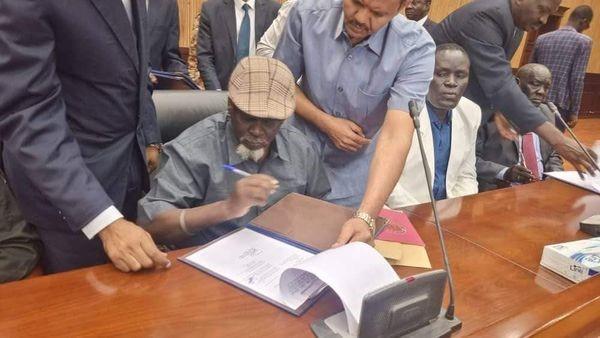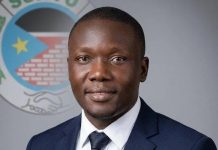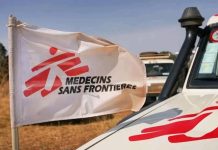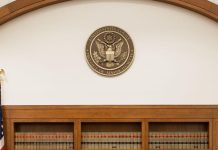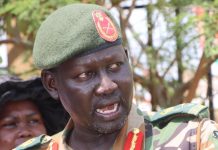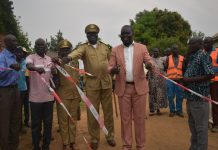Africa-Press – South-Sudan. After the Khartoum deal was signed between the SPLM and SPLA-IO Kit Gwang, paving the way for the integration of the Agwelek forces into the national army, the focus is now shifting to the formation of the Joint Security Committee to begin the process.
The SSPDF spokesperson, Maj Gen Lul Ruai Koang, told The City Review on Tuesday that they were waiting for the delegation to return from Khartoum to give directions and form the committee.
“Let them first come and give directions on how the Joint Security Committee for Kit Gwang and SSPDF will be formed,” Koang said.
In a signed on Sunday, the two parties affirmed their commitment to all provisions of the R-ARCSS, including a provision regarding the Permanent Ceasefire and Transitional Security Arrangements.
For instance, both the SPLM-IG and SPLM/IO Kit- Gwang factions agreed that, “Chollo areas’ boundaries should be resolved as they stood on the 1/1/1956 map and as provided for in the R-ARCiSS” and that “the two parties agreed that, there shall be communities’ forum for peace and reconciliation between the Chollo, Dinka Apadang in Upper Nile State and Ruweng.” This is to promote peaceful coexistence among the communities.
On Sunday, President Salva Kiir granted amnesty to SPLM/-IO Kit Gwang and its Agwelek forces, calling for them to apologise to the people of South Sudan for “wrongdoing.”
“I want to tell my brothers and sisters from Agwelek and the SPLM/A-IO breakaway faction of Kit-Gwang forces that I have forgiven them on behalf of the people of South Sudan, therefore the people of South Sudan are expecting an apology for wrongdoing from you,” Kiir said.
The agreement in question
The deal stipulated that the Joint Security Committee would determine the implementation of the agreements within three months.
The document stated: “The committee shall meet to agree on its terms of reference, identify the assembly areas at Monyo, Southern Malakal, Eastern Jonglei, and other areas, and receive lists and parade of SPLM/A-IO Kit Gwang forces as well.”
The parties also agreed that there will be redeployment and relocation of the Kit Gwang forces from Magenis and subsequent deployment of police forces to provide security to civilians after integration.
SPLM-IG has also pledged to provide logistical services including food and medicine, through the South Sudan People’s Defence Forces (SSPDF) and coordination offices were agreed to be established in Bor, Juba, and Malakal.
The Kit Gwang members were welcomed to Juba and both parties vowed to observe the implementation of the June 27, 2018, peace agreement signed in Khartoum as a device for a total cessation of hostilities.
“The parties recognise and recommit themselves to the ceasefire as per the Khartoum Declaration of Agreement of June 27, 2018, which came into effect on July 1, 2018. The parties shall further observe meticulously the said agreement throughout the Republic of South Sudan to ensure sustainable peace, facilitate the operationalisation of transitional security arrangements and the voluntary repatriation, resettlement, rehabilitation and reintegration of the returnees and internally displaced persons (IDPs),” the copy of the agreement read.
The Agwelek forces, led by Johnson Olony, agreed to remain independent in respect of the ceasefire, although they will be integrated into the South Sudan People’s Defence Force (SSPDF).
Lobbying for support
The agreement has so far been marked with jubilation, as video clips from Khartoum show the Sudanese community welcoming the Kit Gwang leader, Gen Simon Gatwech after the deal was signed.
The former deputy minister of interior, Mabior Garang de Mabior called on South Sudanese to turn out in support of the signed peace agreement.
“The recent agreement signed in Khartoum, between the SPLM-IO (Kit Gwang) and the SPLM-IG, should be celebrated by our civil population as a major milestone in our journey toward lasting peace,” Mabior said.
He said the signed agreement was a step in the completion of what was missing in the implementation of R-ARCSS, basically, Chapter 2, which entails the security arrangements.
Mabior called President Kiir to advance with an amnesty with all the forces which have not yet reached an agreement with the government to return for peace.
“There can be no peace in our country without these forces. It is not only the Kit Gwang group that should sign peace with the IG,” Mabior explained.
“We call on President Salva Kiir to have a policy of open negotiations and amnesty with all armed groups in our land so that they can be brought onboard a robust nationwide security arrangement plan, which can culminate in the establishment of a national army with the ability to ensure lasting peace in our land.”
“Clumsy agreement”
But for critics, this deal is alien as far as the Revitalised Agreement on the Resolution of Conflict in South Sudan (R-ARCSS) is concerned.
On the eve of the signing of the agreement, the executive director of Community Empowerment for Progress Organization (CEPO), Edmund Yakani, said the agreement between the SPLM-IG and Kit Gwang was “a violation of the revitalised agreement and confirmation of splinters’ defection.”
“The signing of the ceasefire agreement without the full participation of the R-TGoNU contradicts the cessation of hostilities agreement 2017 provision in article 2.1.8 on the prohibition of recruitment during the period of implementing the Revitalised Agreement on the Resolution of Conflict in the Republic of South Sudan,” Yakani argued.
The newly formed African People’s Congress released a statement on Monday referring to the agreement as “clumsy”.
The SPLM/A-IO under the leadership of Dr Riek Machar ditched the agreement into the litterbin, saying “it was not a peace agreement.”
The Spokesperson of SPLA-IO, Col. Lam Paul Gabriel said the routine is always that a peace deal should be signed by the feuding parties and thus the agreement between Kit Gwang and SPLM-IG was ridiculous.
He raised a concern that the country might risk ceasefire violations since SPLA-IO was not involved, yet it was the warring party with the Kit Gwang faction.
“The SPLA-IO has been keenly monitoring the agreement and what was signed cannot be called the peace agreement,” Col. Lam.
“That is a clear indication of a way of paying Kit-Gwang for joining the SSPDF, which is a defection.”
For More News And Analysis About South-Sudan Follow Africa-Press

